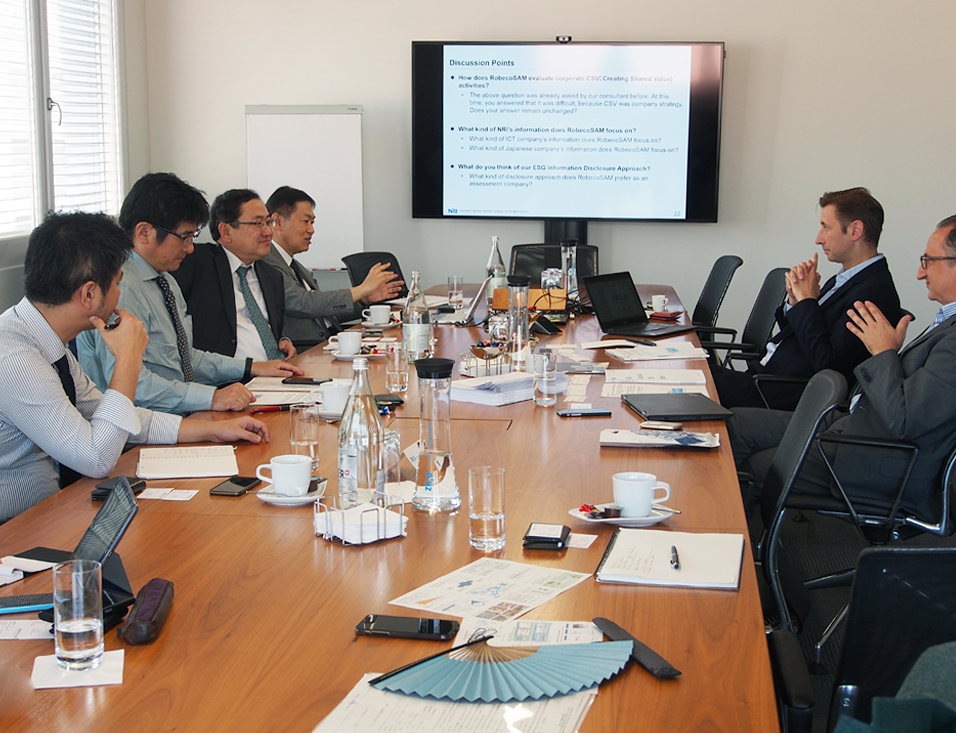
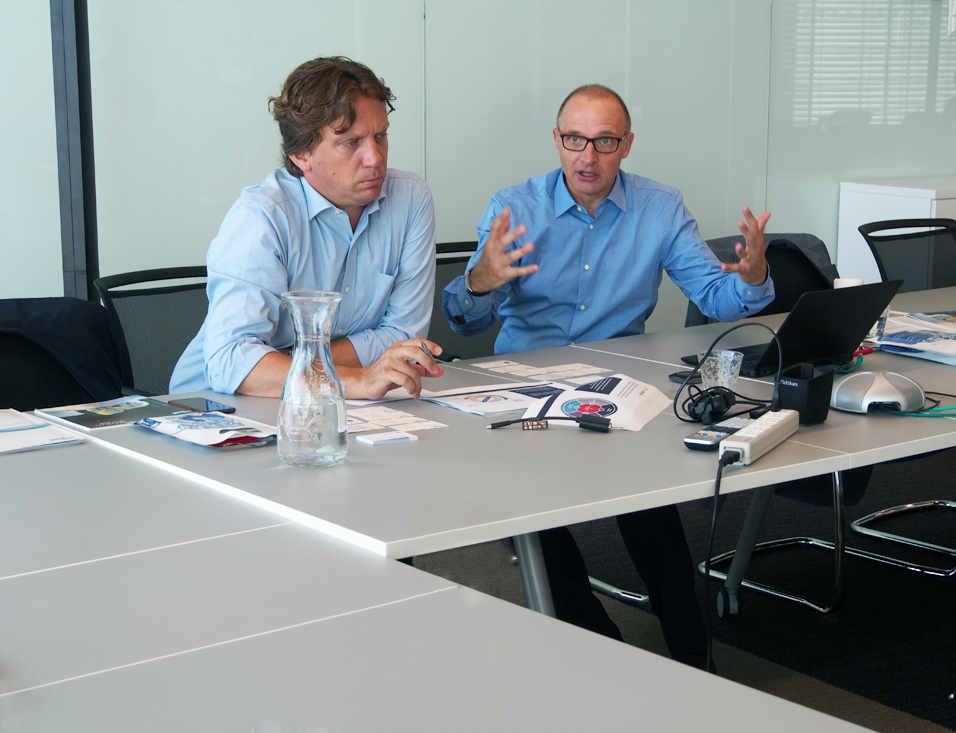
On August 2, 2018, Mr. Kenji Yokoyama, NRI Senior Corporate Managing Director, and NRI managers visited
the World
Business Council for Sustainable Development (WBCSD), a not for profit, international organization
located in
Geneva, Switzerland. WBCSD brings together companies to co-create business solutions that contribute
towards the
SDGs.
On August 3, they visited RobecoSAM, an investment specialist focused exclusively on Sustainability
Investing, in
Zurich, to hold the second overseas CSR dialogue for NRI. Experts from the respective organizations
exchanged
opinions on ESG investors’ expectations for companies and corporate response to SDGs.
Participants
(Affiliation and position as of August 2018)
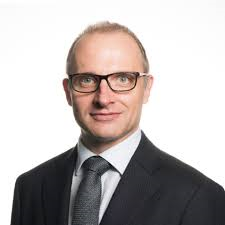
Federico Merlo
WBCSD Managing Director of Member Relations & Senior Management Team
Mr. Merlo is a marketing and sales professional with over 25 years of
experience.
He was involved in product sales and consulting at large multinationals, including DuPont and
Invista, and
start-ups before being appointed WBSCD Director of Member Relations in April 2016. He was
appointed to the
current post in November 2016.
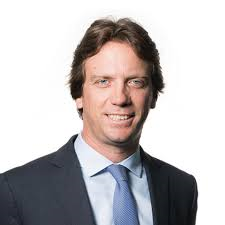
Filippo Veglio
WBCSD Managing Director of People & Senior Management Team
Mr. Veglio joined WBCSD in 2005. Engaging senior representatives of member companies across various industry sectors, business organizations, international organizations, NGOs, and academia, he oversees WBCSD’s work in the following domains: social impact, sustainable lifestyles, global network, policy, SDGs, and the measurement of WBCSD’s performance.
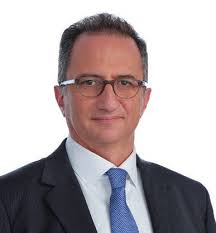
Edoardo Gai, MSc
RobecoSAM, Managing Director, Head of Sustainability Services
Edoardo Gai is Head of Sustainability Services at RobecoSAM, a unit he created in 2006 in response to companies’ need for information and know-how on sustainability issues. He first joined RobecoSAM as an analyst for the ICT sector, and later became responsible for the process of collecting and evaluating sustainability data. Edoardo was also instrumental in designing the selection process for the Dow Jones Sustainability Index (DJSI) and briefly served as Co-Head of Indexes. Prior to RobecoSAM, Edoardo worked for Triodos NV in the Netherlands as a sustainability analyst and for the SiRi Group. He started his career at HMT microelectronic, after graduating with a Master’s degree in electronic engineering from the Swiss Federal Institute of Technology in Zurich, Switzerland (ETH). He joined RobecoSAM in 2000.
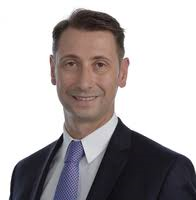
Jvan Gaffuri, CEFA
RobecoSAM, Director, Senior Manager, Sustainability Services
Jvan Gaffuri is a member of RobecoSAM’s Sustainability Services Team where he works with companies to benchmark their sustainability policies, operations and performance. Given his expertise in sustainability benchmarking, Jvan regularly presents at conferences with companies on financial materiality of sustainability throughout the world. He began his career at RobecoSAM as a senior equity analyst in the equity research team covering technology companies and firms specializing in pollution control. His professional roles also span experience as a Portfolio Manager/Financial Analyst for Japanese and Asia/Pacific equities (deputy for USA) at Swiss Life. Jvan began his career within the investment research department of the Banca del Gottardo (Switzerland) where he was in charge of the analysis of equity markets in Japan and the Asia/Pacific region. Jvan Gaffuri studied economics at the University of St. Gallen (Switzerland) and is a Certified European Financial Analyst (CEFA). He joined RobecoSAM in 2006.
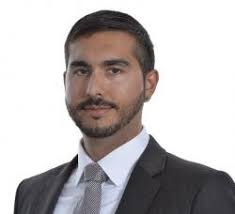
Manjit Jus
RobecoSAM, Director, Head of ESG Ratings
Manjit Jus is the Head of the ESG Ratings team. He is responsible for the operational process for the Corporate Sustainability Assessment (CSA), including the creation of the Dow Jones Sustainability Indices, the management of Evalueserve, the external partner supporting the data collection and validation efforts for the CSA as well as RobecoSAM’s proprietary software used for storage and collection of sustainability data. In addition, he is responsible for the coverage of the sustainability data related to a number of industries including Aerospace & Defense and Airlines. Manjit holds a Bachelor’s degree in Business Administration with a focus on International Management. He joined RobecoSAM in 2011.
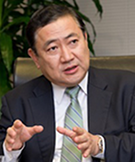
Kenji Yokoyama
Senior Corporate Managing Director, NRI
Mr. Yokoyama leads initiatives for promoting sustainability and solution for social issues through NRI business, based on middle- and long-term perspective. He is in charge of sustainability, global operation planning, corporate communication, administration, operations and control, and procurement, accounting and finance.
Other participants from NRI
Yoshiro Shikino, General Manager, Administration Department
Kenji Honda, Manager of Sustainability & Responsibility Group
Shigeru Fujisawa, Manager, Sustainability & Responsibility Group
Facilitator
Hiroshi Ishida, Executive Director, Caux Round Table Japan
Observer
Nobuo Taguchi, Senior Manager, CSR Promotion, ANA Holdings Inc.
CSR Dialogue with WBCSD
What kind of organization is WBCSD? How does it promote SDGs?
Federico Merlo:
WBCSD is a non-profit organization with
resources
mostly
from corporate membership fees and funding for target projects.
WBSCD has 200 member companies, of which 20 are Japanese. We develop a platform for
helping
businesses create business models for collaborating globally in tackling SDGs and
other social
issues.
Businesses are the main entities carrying out activities on the platform. There are
no
governments
or NGOs. We are uniquely positioned in having established “Safe Space”
in which
companies can freely exchange views learn from each other and co-create new
solutions

Filippo Veglio:
WBCSD supports businesses collaborate and generate added value in how they specifically, through business, address social challenges identified in the SDGs. Some of the themes of particular focus include concerns of negative impact on future society caused by “developmental disorder of infants from under-nutrition,” “food waste,” and “agricultural issues (chemical fertilizers).”
Filippo Veglio:
At WBCSD, we believe that no single company can solve social issues alone. And to expand impact on society and scalability, we recommend businesses to participate in the activities based on the following three concepts:
Innovation: Provide innovation to solve social issues through sustainable business;
Collaboration: Connect businesses with various stakeholders and other companies for value creation; and
Valuation: Discover true value and not just economic value.
What are the main conferences hosted by WBCSD?
Federico Merlo:
WBCSD runs two conferences per year, one for the CEOs of participating companies and the other for the Chief Sustainable Officers (CSOs).
[CEO conference]
Each year, the CEO Strategic Meeting is organized in October in a country outside Switzerland. CEOs share the “Mission” and “Vision” mainly from a sustainability perspective. Planned future venues include Singapore in 2018, Portugal in 2019. Location of the 2020 edition will be defined shortly.
[CSO conference]
Each year, CSOs draw up action plans for management of target projects. The conference is organized in Switzerland in April every year.
What are the benefits of joining WBCSD?
Federico Merlo:
At WBCSD, we have close to 30 active, target projects. Each member company participates in two or three target projects. There are three benefits to joining WBCSD, as follows:
- Sharing “Mission & Vision”
By joining WBCSD, the company can exchange views with CEO-level executives from 200 companies, share the sustainability vision and values, and build a human network at the annual CEO meetings. At the CEO meeting, about 60% of the companies are represented by CEOs. For the rest of the companies, senior executives deputize.

- Gain a foothold as a leading company
By participating in the working group for target projects, the company can establish its position as a leading company exercising initiative in the field. - Obtain knowledge and wisdom and be part of the shaping and creating of new business solutions The company can obtain knowledge on world trends through activities in WBCSD and collecting information at meetings. They can also be part of the creation of solution before these are imposed on companies through regulation or emergencies.
Yokoyama:
Thank you very much for your valuable input. We have long considered our response to SDGs. Your input has helped us understand the fundamental aspects of SDGs so that we are beginning to have a better image of our approach to SDGs. To address SDG-related social issues, we hope to work with other companies and enable our company to generate social value through business. We would also like to consider joining WBCSD.
CSR Dialogue with RobecoSAM
As an ESG native investment specialists focused on Sustainability Investing, how do you see CSR activities by companies?
Edoardo Gai:
The starting point is that we evaluate companies from an “investor’s perspective.” In other words: we believe that companies should not just contribute to creating a more sustainable world, but also build a sustainable and profitable business through providing solutions to challenges stemming from ESG issues. We analyze how companies are operating while quantitatively measuring their positive and negative impacts on society and whether they disclose that information.
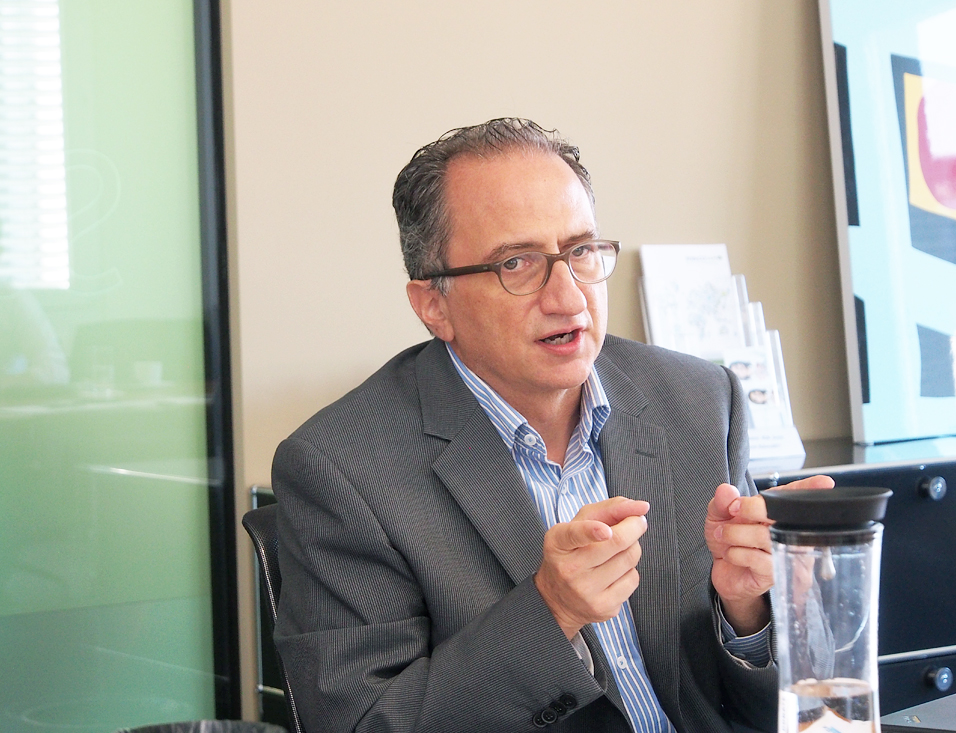
How do you adjust the rating criteria to changes in society?
Edoardo Gai:
We use a rules-based rating methodology across all countries around the world which is not customized based on the situation in different regions. However, the ratings methodology is sector specific. And because social issues that need to be addressed differ from industry to industry, we try to identify global trends: for example by collecting information from various initiative organizations, by participating in international conferences, and by exchanging information with the individual companies. Additionally, our sector expertise and foresight allow us to identify still to come and under researched and under-reported issues.
Jvan Gaffuri:
The ICT industry has always played a crucial role in the development of society. Not only by connecting people and corporations, but also by making all kind of processes more reliable and efficient. Nowadays, similar to what was experienced with the introduction of new technologies, there is a big fear that AI and industry 5.0 will erase many jobs, creating a big societal imbalance. It is therefore very important that the development of these new technologies is thoroughly followed, and all stakeholders are involved in order to limit the negative impacts. Only through adhering to this process it will be possible to state that the introduction of a new technology has generated a net positive impact on the economy and the society. It is therefore crucial at this point that all actors and stakeholders collaborate in order to find the best way for the future. We at RobecoSAM are very open to listen and, where possible, contribute to the discussion.
What is the timing and the decision-making process for revising the assessment criteria?
Jvan Gaffuri:
RobecoSAM has quite an elaborated process for the development of the methodology. We constantly review the capability of a criteria to differentiate companies, and analyze its financial materiality. Additionally, when revising them, we evaluate trends by holding dialogues with businesses, listening to demands of society, and looking at social issues that are arising. As for the timing, we have an annual review in which we revise the criteria. The final decision is made by the methodology committee that revises all proposals. What we try to bear in mind
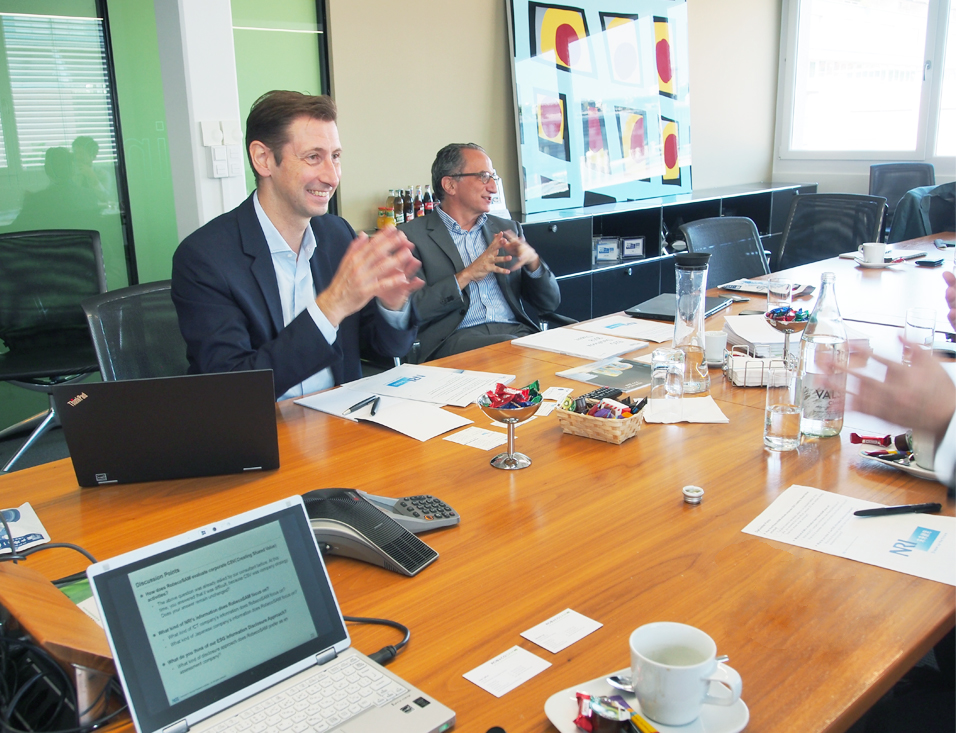
when setting or revising the assessment criteria is that we need to always be one step ahead of companies. The difficulty is that we cannot be too far ahead or too far behind. The challenge is to separate between criteria that anticipate coming trends that will affect the competitiveness and the valuation, and ESG data that is already appreciated and reflected in in the valuation because it has already been recognized as relevant. Every year around March at the beginning of a new cycle we do our best to inform companies about the changes of criteria and methodology, and explain the rationale behind them. In this context we organize briefing sessions – also in Japan – and answer questions companies might have about the new methodology.
In what form do you require companies to disclose their ESG information?
Manjit Jus:
From our perspective it is not relevant which channel a company uses to disclose their data. It can be a data book which focuses on ESG, an integrated report, a website or any other format. What is relevant to us is that the information is audited, easily accessible and found, and that the company explains how this information is financially material. For investors it is relevant that the disclosed information provides enough background for an analysis for potential negative risks and the impact that these risks might have on the business if they becomes real. This information should be presented in ways which are easy to understand for the investors. Companies can build trust and fulfill their accountability by publicly disclosing their processes for resolving selected issues.
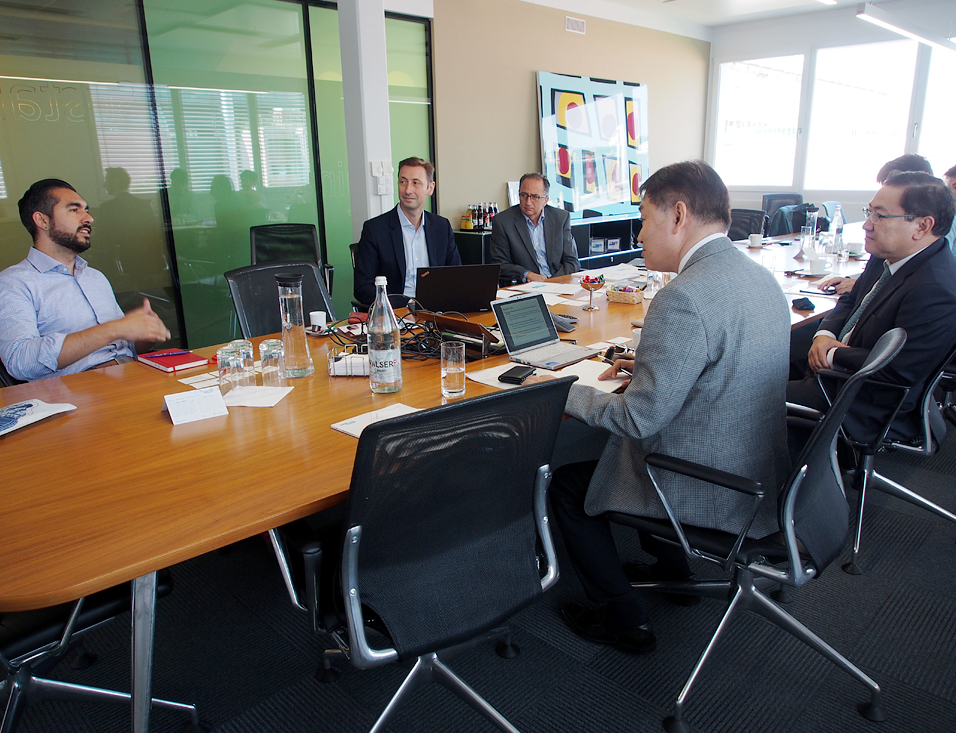
What expectations do ESG investors have for companies?
Jvan Gaffuri:
ESG investors have expectations for companies to not simply contribute to making a better world through, for example, giving donations or engaging in volunteer activities, but to set up business models and create value by involving various stakeholders to enhance economic and social value. In the process of creating value, companies need to identify what negative impact its business is having on its entire group, including overseas supply chains, and disclose this information. In particular, as for global companies, investors today have increased their expectations in the areas of society – more so than for the environment or governance – and particularly regarding human rights, especially issues related to workplace environment, discrimination and abuses of rights of people living in local communities. In these fields, investors expect companies to engage in due diligence, identify potential risk issues that may have significant negative impact on society, and set key performance indicators (KPIs) on their future response.
Edoardo Gai:
In future corporate management strategy, the question will be whether the company has established a permanent risk management system in the management decision-making process for minimizing risk in contingencies. This will require accurately identifying signs of social change. Companies are expected to have a functional management system that subsumes a full range of values from the point of view of diversity and inclusion.
Manjit Jus:
Nowadays, investors not only expect companies to manage risks and opportunities from ESG, but also expect them to have positive contributions towards the SDGs. Therefore, rather than simply disclosing all available data, I would like to see companies put a focus on how much measurable positive or negative impact their business is having on society and disclose that information.
Jvan Gaffuri:
For the ICT industry there are big expectations due to its drive for innovation and its qualification to improving and increasing efficiency of our society. Evidently, this needs to happen by carefully monitoring also the creation of new jobs as replacement for jobs that people might lose from technology advancement. It is difficult to find a balance, but in the past, this industry has demonstrated to be “connected” to society. In this regard, I am confident that it will master this challenge in the best interest of all parties.
Yokoyama:
Thank you very much for your valuable opinions. It struck me that ESG investors expect companies to integrate efforts to build a sustainable society in the business strategy and to disclose the impact of such a business strategy. It also struck me that as for the ICT industry, while there are concerns for the negative impact from advancement in technology, there are even greater expectations for the positive side of such advancement. Our aims will be to develop as an ICT company in ways we can meet the expectations of ESG investors.
(Published in 23,JAN. 2019)